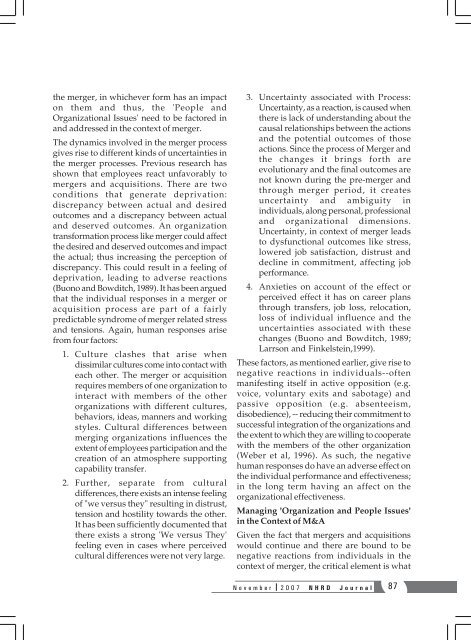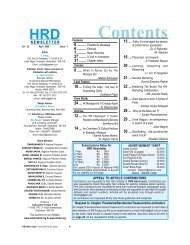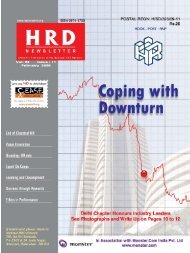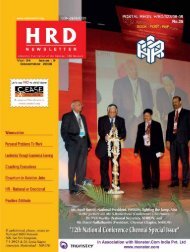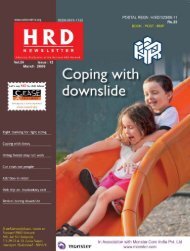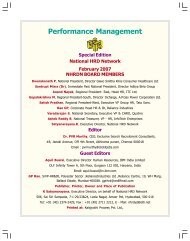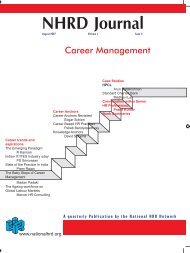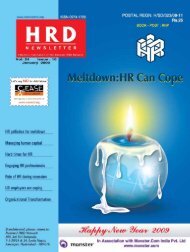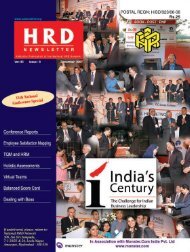NHRD Journal - National HRD Network
NHRD Journal - National HRD Network
NHRD Journal - National HRD Network
You also want an ePaper? Increase the reach of your titles
YUMPU automatically turns print PDFs into web optimized ePapers that Google loves.
the merger, in whichever form has an impact<br />
on them and thus, the 'People and<br />
Organizational Issues' need to be factored in<br />
and addressed in the context of merger.<br />
The dynamics involved in the merger process<br />
gives rise to different kinds of uncertainties in<br />
the merger processes. Previous research has<br />
shown that employees react unfavorably to<br />
mergers and acquisitions. There are two<br />
conditions that generate deprivation:<br />
discrepancy between actual and desired<br />
outcomes and a discrepancy between actual<br />
and deserved outcomes. An organization<br />
transformation process like merger could affect<br />
the desired and deserved outcomes and impact<br />
the actual; thus increasing the perception of<br />
discrepancy. This could result in a feeling of<br />
deprivation, leading to adverse reactions<br />
(Buono and Bowditch, 1989). It has been argued<br />
that the individual responses in a merger or<br />
acquisition process are part of a fairly<br />
predictable syndrome of merger related stress<br />
and tensions. Again, human responses arise<br />
from four factors:<br />
1. Culture clashes that arise when<br />
dissimilar cultures come into contact with<br />
each other. The merger or acquisition<br />
requires members of one organization to<br />
interact with members of the other<br />
organizations with different cultures,<br />
behaviors, ideas, manners and working<br />
styles. Cultural differences between<br />
merging organizations influences the<br />
extent of employees participation and the<br />
creation of an atmosphere supporting<br />
capability transfer.<br />
2. Further, separate from cultural<br />
differences, there exists an intense feeling<br />
of "we versus they" resulting in distrust,<br />
tension and hostility towards the other.<br />
It has been sufficiently documented that<br />
there exists a strong 'We versus They'<br />
feeling even in cases where perceived<br />
cultural differences were not very large.<br />
3. Uncertainty associated with Process:<br />
Uncertainty, as a reaction, is caused when<br />
there is lack of understanding about the<br />
causal relationships between the actions<br />
and the potential outcomes of those<br />
actions. Since the process of Merger and<br />
the changes it brings forth are<br />
evolutionary and the final outcomes are<br />
not known during the pre-merger and<br />
through merger period, it creates<br />
uncertainty and ambiguity in<br />
individuals, along personal, professional<br />
and organizational dimensions.<br />
Uncertainty, in context of merger leads<br />
to dysfunctional outcomes like stress,<br />
lowered job satisfaction, distrust and<br />
decline in commitment, affecting job<br />
performance.<br />
4. Anxieties on account of the effect or<br />
perceived effect it has on career plans<br />
through transfers, job loss, relocation,<br />
loss of individual influence and the<br />
uncertainties associated with these<br />
changes (Buono and Bowditch, 1989;<br />
Larrson and Finkelstein,1999).<br />
These factors, as mentioned earlier, give rise to<br />
negative reactions in individuals--often<br />
manifesting itself in active opposition (e.g.<br />
voice, voluntary exits and sabotage) and<br />
passive opposition (e.g. absenteeism,<br />
disobedience), -- reducing their commitment to<br />
successful integration of the organizations and<br />
the extent to which they are willing to cooperate<br />
with the members of the other organization<br />
(Weber et al, 1996). As such, the negative<br />
human responses do have an adverse effect on<br />
the individual performance and effectiveness;<br />
in the long term having an affect on the<br />
organizational effectiveness.<br />
Managing 'Organization and People Issues'<br />
in the Context of M&A<br />
Given the fact that mergers and acquisitions<br />
would continue and there are bound to be<br />
negative reactions from individuals in the<br />
context of merger, the critical element is what<br />
November 2007 <strong>N<strong>HRD</strong></strong> <strong>Journal</strong> 87


